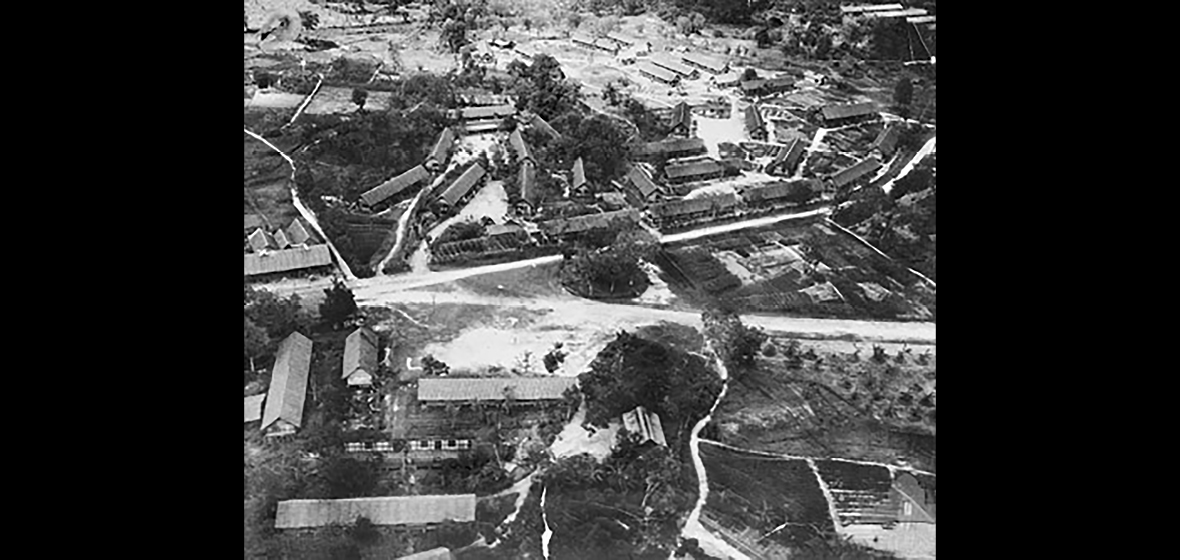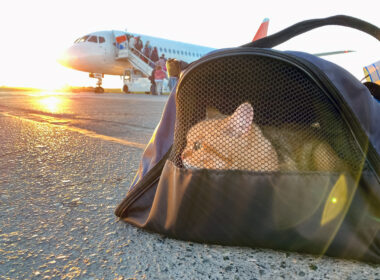In the lead-up to ANZAC Day, LSJ collates stories from a unique “law school” that was founded and operated by Australian lawyers inside the Kuching Prisoner of War camp. Studious troops wrote home about their experiences between 1944 and 1945.
Main image: Aerial view of part of Batu Lintang POW camp, Sarawak, Borneo. Photograph taken on or after 29 August 1945. Public Domain, WikimediaCommons
Seventy-five years ago, Australia was in shock as the survivors of the Japanese prisoner-of-war camps came home. Place names such as Sandakan and the Burma-Thailand Railway became synonymous with murder, starvation, and privation. Among the prisoners who returned home were solicitors, barristers, law students and clerks. Some told their stories, but many, after brief public appearances and welcome home parties, retreated into their private worlds, keen to re-establish interrupted careers. One reason for the survival of these men was their ability to establish activities to distract themselves from the ugliness of their lives behind barbed wire.
Among the theatrical groups, sports clubs and debating societies was a law school, first established in Changi POW camp but later to become part of what was colloquially referred to as University Kuching in Kuching Prisoner of War Camp in Sarawak, Borneo.
Two lawyers, solicitor Ivan Hains from Sydney and barrister Len Draney from Queensland, made great efforts to continue the legal education of their comrades, despite Japanese regulations forbidding prisoners from teaching or lecturing on any subject.
Under Hains’ and Draney’s direction, Australian troops attended law lectures, studied readings and even undertook exams in the POW camp. These are their stories.
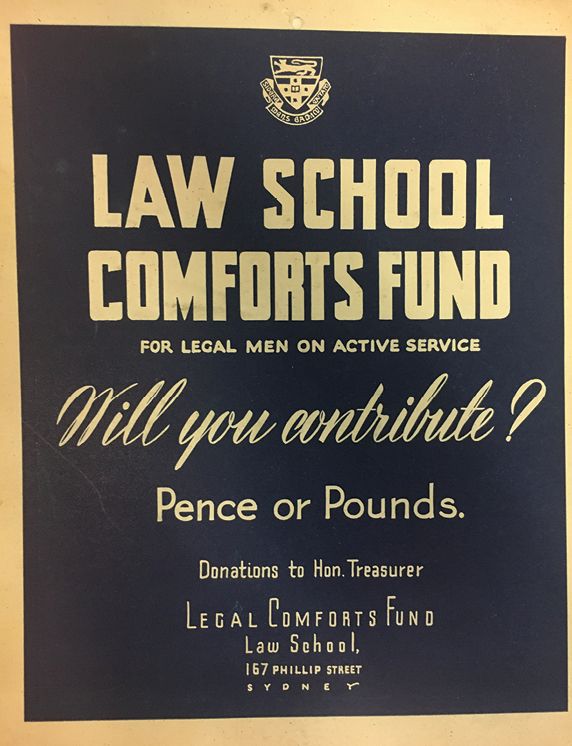
Frank Washington
The course at Kuching was quite extensive, comprising one to one-and-a-half daily lectures and readings on units such as contract law, law of evidence, probate, pleading and company law, which was conducted by a fourth-year law student, Lieutenant G. Gettens. Exams were held and candidates given a certificate that attested to their level of competence and that they had reached, for example, the level required to enter second-year law at Sydney University.
One “student” from the time in Kuching, Frank Washington, left a rare, detailed account of the law school:
The early part of 1944 marked the beginning of the Law School in the P.O.W. Camp at Kuching (Borneo). It all began with a copy of Anson’s Law of Contracts (the property of a Government Official) being smuggled from a nearby camp in which some of the British residents off Sarawak were interned. At the time, the [Japanese] had confiscated most of the books in the camp and only light novels were available for reading. Naturally, when Anson arrived, there was great jubilation on the part of some half dozen of the legal fraternity and three law students. Having in mind the imminent danger of the book suffering the same fate as other text books, the writer undertook the typing of two copies of the Law of Contracts. The portable typewriter (the secret weapon) encased in a small wooden box on the cover of which was painted a draft board, escaped detection despite innumerable searches.
To obtain sufficient paper was the immediate problem, as paper of any kind was almost unprocurable. This difficulty, however, proved to be the least of our worries, being overcome by making a canvass of scraps of paper, of wrapping from rice biscuits, clear portions of newsprint, inside covers of books and paper given us in which to roll our tea leaves and substitute tobacco, the job was finished. This laborious task, done inåtermittently, took about a month to complete and was accompanied, as you may guess, by much cursing and moaning on the part of the typist. Upon its completion, the smuggled copy was sent back and the Kuching P.O.W. Law School then began in earnest.
When [the Japanese] saw the writing on the wall, they instituted a Camp Library and in due course Anson and other books again appeared on the scene. About the same time, all the available paper for smoking, including pieces of cardboard, Holy Writ etc. was finished. Covetous eyes were now cast on the two typed copies of Anson, which had been superseded by the printed editions. The pressure of public opinion was irresistible and so the big decision was made – our two typed copies of Anson were to be “smoked”. . . How well the writer remembers smoking his efforts on the “uberrimae fidei”. Indeed this was a sorry end of Anson, but I’m sure his Law of Contracts will remain uppermost in the minds of the legal fraternity on the camp of Kuching, if only for the memory of this incident. No doubt the inhalations of legal knowledge at Kuching will, in due course, improve the decisions of the High Court of Australia.
Alan Loxton
Alan Loxton had commenced articles with Allen, Allen & Hemsley (a precursor firm to Allens) before enlisting in the army. He was wounded in Singapore and was later transferred to notorious Sandakan Prison in North Borneo. Luckily for Loxton, he was transferred with the officers out of Sandakan before one of the most notorious of all episodes in the war – the Sandakan Death March, which caused the deaths of more than 1,000 allied POWs, as well as the loss of a further 1,400 in the camp itself.
By comparison, Kuching, for all its terrors (one of the guards was nicknamed “ball kicker” for obvious reasons) was not as bad as Sandakan. Loxton described his time in the new camp.
In Kuching, we did no outside work except what was essential for our own maintenance – wood parties, gardening, cleaning, etc. Our food was reduced however in consequence … a bit of gardening … then reading, bridge, a bit of law to work at … chess, or just a sleep, and the day soon passes.
My plans for the future … to continue law if possible with Allen Allen & Hemsley … I think the first thing I want to mention is the necessity to get in touch with Mr Reichenbach to let them know I want to come back to them, but on what grounds as far as they are concerned. It is more than five years since I entered articles, and I have an idea time under them has continued to run, although I was only 15 months in the offices. That brings me to point number two. Ask Uncle Merlin to obtain the latest Law Almanac for me and, if he is going to write, he might mention what it has to say on the subject of articled clerks on war service. He might also mention things legal generally–who’s who and what’s what. If you have any faculty news, I would appreciate it. Then point three … Could you obtain copies from 1939-45 of the ‘Scotsman’, ‘Newingtonian’, Syd. Uni. Union magazine the ‘Recorder’, the faculty mag, ‘Blackare’, the St. Andrews mag and a good digest of events covering the period I have been more or less out of it. This sounds like a swag, but it is rather important … because we have virtually no news for three-and-a-half years.
Loxton successfully re-entered the world of the law through Allen, Allen And Hemsley when he returned to Australia. He completed articles with esteemed solicitor and Army officer Sir Norman Cowper, accompanying him to Canberra to work on the Bank Nationalisation case, and was admitted as a solicitor on 17 March 1950. He made partner in the firm in 1951 and was a senior partner in the early 1980s. He was instrumental in setting up the College of Law and even became President of the Law Society of NSW between 1974 – 75.
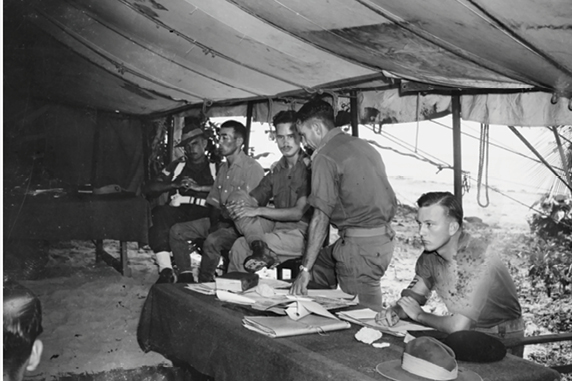
Bruce Gollan
Another law student in Kuching, Bruce Gollan, was a close friend of Alan Loxton. Gollan may well have benefited from the Kuching Law School as he resumed his articles and was admitted as a solicitor on 27 May 1949. He went on to be a partner with Perkins Stevenson and Linton (a successful law firm which was an antecedent of MinterEllison).
Gollan’s former clerk, Alex Halliday, recalls him as a “nuggety”, very strong, tough man who had been beaten by the Japanese for intervening on behalf of his men. He never wanted to be hungry again – and succeeded in this ambition. Gollan rarely spoke of his experiences but avoided anyone or anything Japanese for years after the war, including refusing to act for Japanese clients.”
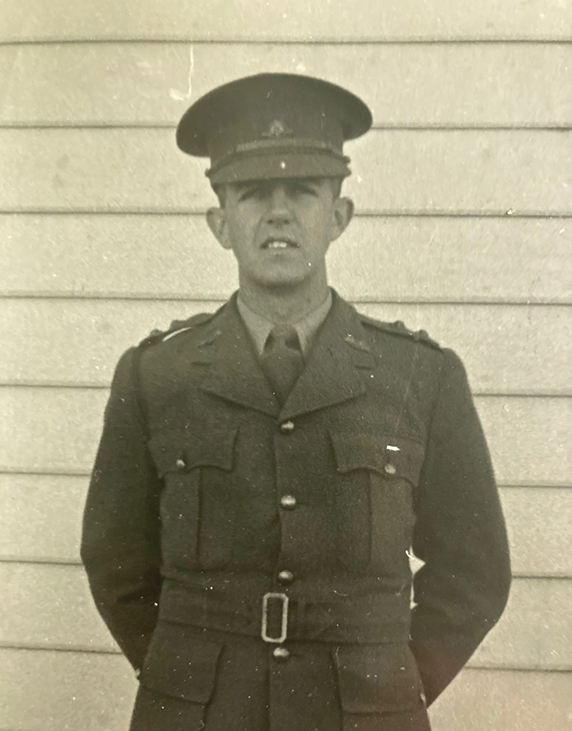
Ivan Hains
Ivan Hains returned from war to some publicity. He was interviewed by the Sydney Morning Herald and described his treatment. “The bigger the men,” he related “the more the Japanese picked them out for punishment, and I received my share of battering.” Hains was of ample proportions before he left Australia, so the implication is he would be included among the “bigger men”.
Jim Main of JMA Legal was articled to Hains in 1971 and supplied his memories of him: It was in the days of death duties and Ivan had a deep understanding and knowledge of how they worked and structures that could be put in place to minimise the devastating impact on primary producers, as the duties were based on the value of assets. He also had extensive local government practice … He was a pretty strict disciplinarian in the office.
He was very efficient and no nonsense in his work. No such thing as “Dear Sir”– just a heading and launching into the letter, one line per paragraph and no superfluous words. He certainly never told me about his experience as a tutor while in captivity. The only memory I have of anything he said was in relation to food, which was always in extremely short supply and how you had to eat anything you could see that was edible.
After the war
After the war, the pursuit of justice for the Japanese became intense. Guards from Sandakan and Kuching camps were put on trial at Labuan, in a process set up by Sydney barrister Russell Le Gay Brereton. He was replaced by Lieutenant Raymond Balzer, a young solicitor from Goulburn, who prosecuted 11 trials.
Among those trials was one of four Japanese officers from Kuching Camp. They were found guilty of allowing “frequent cruel assaults on prisoners” as well as denying “sufficient food, medical supplies and medical attention [and] and forcing prisoners of war … when sick and starving to do heavy manual labour whereby … many died”.
Among the statements presented as exhibits for the prosecution were those of the solicitor and POW Brian Craven Meagher, and the aspiring law student Frank Washington. Two of the accused, Captain Nakata Takeo, Lieutenant Ojima Takeo, were executed on Morotai on 3 March 1946 by firing squad, along with 11 other war criminals, after shouting “Banzai” (a Japanese battle cry) three times.
The material collected here has lain dormant for decades; just one of the many remarkable stories that men rarely mentioned after the war had ended – but the war left a mark upon them. Former High Court Justice Michael Kirby remarks that:
“These wartime experiences helped to form men whose tolerance of varying human characteristics was combined with a strong sense of discipline and order and adherence to traditional values of service and duty.”

